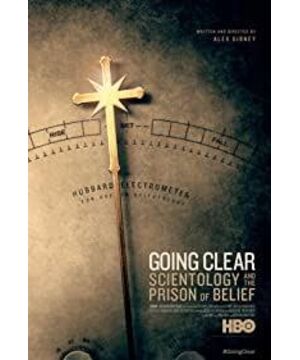http://www.scientificamerican.com/article/the-real-science-behind-scientology/
Author: Michael Shermer (Michael Shermer)
A science fiction novelist founded a ridiculous "Scientology", but believers still Quite a lot.
In the 1990s, I had the opportunity to have dinner with the late musician Issac Hayes. During that time, Hayes' career progressed by leaps and bounds, and he attributed all the credit to "scientology." This is undoubtedly the enthusiastic admiration of "Scientology" by a devout believer, but Hayes' success can really be regarded as evidence of the effectiveness of Scientology? Both books published not long ago believed that "Scientology" contained no science but only a few quasi-religious creeds, and the creeds were wrapped in a layer of new century nonsense disguised as science. One of them is "The Church of Scientology" (The Church of Scientology), written by Hugh B. Urban, a professor of religion at Ohio State University. It is the most academic study of this organization so far. The other is "Inside Scientology" by investigative journalist Janet Reitman (Janet Reitman). This is an exciting work with many amazing and informative records, such as a long validity period. A billion-year contract, a bold recruitment plan, the church's verbal and physical punishment of its staff, etc.
The problem with believers’ words is that they do not constitute scientific evidence. Social psychologist Carol Tarvis said to me: "Some therapies are praised by patients only because of the "justification-of-effort effect" (justification-of-effort effect). . Anyone who has put in time, money and effort in a treatment will say that the therapy is useful. Scientology may be helpful to Isaac Hayes, just as psychoanalysis and bungee jumping are helpful to others Same as help, but this does not prove that Scientology’s intervention is the reason for Hayes’s success. To know what Scientology’s superiority is, you must carry out controlled studies—you have to randomly assign the research subjects to science. The teaching group and the control group (that is, let the subjects in this group receive another therapy), and then compare the treatment effects of the two groups of subjects. "As far as I know, no one has done such a study. Behind "Science Education", the real science seems to be the understanding of human psychological needs-as social animals, we all hope to join a support group and are willing to spend a lot of money on this.
If "Scientology" is not science, is it religion? It does have its own creation myth: Xenu, the leader of an interstellar alliance, rules 76 planets. About 75 million years ago, Znu used a spacecraft similar to a DC-8 jet to transport billions of aliens to a planet called Teegeeack (Earth). There, Znu put them into some volcanoes next to each other and detonated a hydrogen bomb to kill them. The "thetan" (soul) of these aliens stayed on the earth, waiting to enter the body of the earthlings in the future. It is this period of history that has brought great spiritual damage and misfortune to today’s human beings, but these injuries and misfortunes can be achieved through special techniques, using the "E-meter" as a tool, in the name "Listening". Resolve in the process of auditing.
Thanks to the Internet-before, this story had to pay tens of thousands of dollars and was only eligible to learn about it after the "Scientology" was upgraded to OT III, but now it is widely known and even compiled In the 2005 episode of the American drama "South Park" (South Park). According to the numerous posts published on the Internet by former fans of Scientology, the records in the court file about Hitan three-tier followers, and the former followers of Scientology have written a large number of articles after hearing this story with their own ears. From books and articles, we can see that Znu’s story is probably the creationism of "Scientology". So, are these stories really as rumors as they were casually fabricated by the founder of the sect, L. Ron Hubbard, because he felt that founding religion was more profitable than writing science fiction? (Hubbard is also a science fiction writer and author of "The Killing of the Earth.")
Rumors are just rumors and cannot be written as facts. In order to find the truth, I recently visited the famous science fiction writer Harman Ellison (Harman Ellison) and asked him about the birth process of "Scientology". According to Ellison, the matter originated from a conference held in New York by a science fiction writer organization called the Hydra Club, and he witnessed the birth of Scientology. At that time, Hubbard complained to L. Sprague de Camp (L. Sprague de Camp) and other people that the cost of a penny for a word was too low, "So Lester del Rey (Lester del Rey) Half-jokingly said, “You really should go to establish a religion, because that would be tax-free.” Then, the people in the room babbled ideas for the new religion. Later, Hubbard adopted these ideas. , Wrote "Dianetics: A New Science of the Mind" (Dianetics: A New Science of the Mind) and sold it to John W. Campbell, Jr., a famous American science fiction editor ), the latter published the article in "Marvel Science Fiction" in 1950."
In all fairness, Zno’s story is not more ridiculous in science than other religious origin myths. However, if there is no verifiable method to judge which of these creation cosmologies is correct, then they are nothing but amazing science fiction stories.
-------------------------------------------------- ------------------
Michael Shermer:
"Scientific American" columnist, founder of "Skeptic Society" and " The publisher and editor-in-chief of The Skeptic, Michael Schermer is dedicated to combating rumors, superstitions and pseudoscience, and author of "Why do people believe in weird things?" "The Science of Good and Evil" "Why is Darwin important?" "The Thought of the Market."
View more about Going Clear: Scientology & the Prison of Belief reviews











